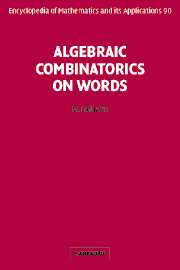Book contents
- Frontmatter
- Contents
- Preface
- Chapter 1 Finite and Infinite Words
- Chapter 2 Sturmian Words
- Chapter 3 Unavoidable Patterns
- Chapter 4 Sesquipowers
- Chapter 5 The Plactic Monoid
- Chapter 6 Codes
- Chapter 7 Numeration Systems
- Chapter 8 Periodicity
- Chapter 9 Centralizers of Noncommutative Series and Polynomials
- Chapter 10 Transformations on Words and q-Calculus
- Chapter 11 Statistics on Permutations and Words
- Chapter 12 Makanin's Algorithm
- Chapter 13 Independent Systems of Equations
- References
- Index of Notation
- General Index
Chapter 5 - The Plactic Monoid
Published online by Cambridge University Press: 05 April 2013
- Frontmatter
- Contents
- Preface
- Chapter 1 Finite and Infinite Words
- Chapter 2 Sturmian Words
- Chapter 3 Unavoidable Patterns
- Chapter 4 Sesquipowers
- Chapter 5 The Plactic Monoid
- Chapter 6 Codes
- Chapter 7 Numeration Systems
- Chapter 8 Periodicity
- Chapter 9 Centralizers of Noncommutative Series and Polynomials
- Chapter 10 Transformations on Words and q-Calculus
- Chapter 11 Statistics on Permutations and Words
- Chapter 12 Makanin's Algorithm
- Chapter 13 Independent Systems of Equations
- References
- Index of Notation
- General Index
Summary
Introduction
Young tableaux have had a long history since their introduction by A. Young a century ago. It is only in the 1960s that there came to the fore a monoid structure on them, a structure taking into account most of their combinatorial properties, and having applications to the different fields in which Young tableaux were used.
Summarizing what had been his motivation to spend so much time on the plactic monoid, M.R Schützenberger drew out three reasons: (1) it allows us to embed the ring of symmetric polynomials into a noncommutative ring; (2) it is the syntactic monoid of a function on words generalizing the maximal length of a nonincreasing subword; (3) it is a natural generalization to alphabets with more than two letters of the monoid of parentheses.
The starting point of the theory is an algorithm, due to C. Schensted, for the determination of the maximal length of a nondecreasing subword of a given word. The output of this algorithm is a tableau, and if one decides to identify the words leading to the same tableau, one arrives at the plactic monoid, whose defining relations were determined by D. Knuth.
The first significant application of the plactic monoid was to provide a complete proof of the Littlewood-Richardson rule, a combinatorial algorithm for multiplying Schur functions (or equivalently, to decompose tensor products of representations of unitary groups, a fundamental issue in many applications, e.g., in particle physics), which had been in use for almost 50 years before being fully understood.
- Type
- Chapter
- Information
- Algebraic Combinatorics on Words , pp. 164 - 196Publisher: Cambridge University PressPrint publication year: 2002
- 2
- Cited by

